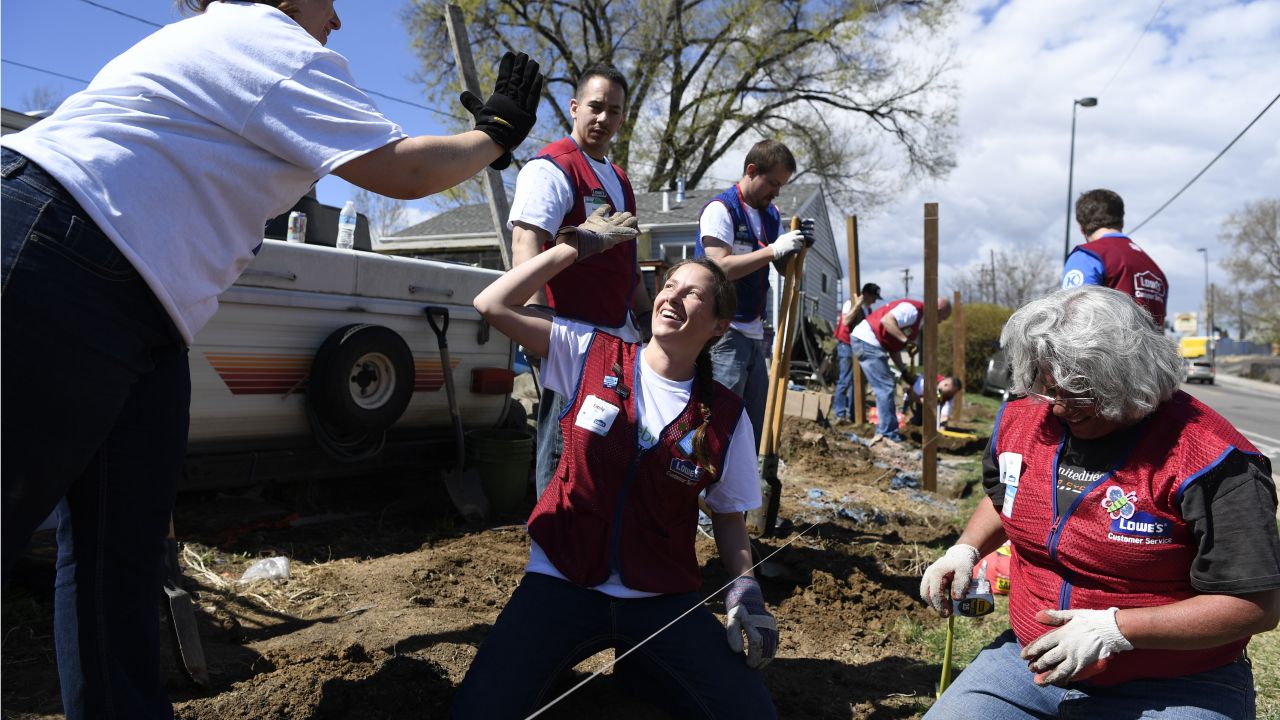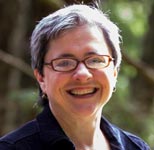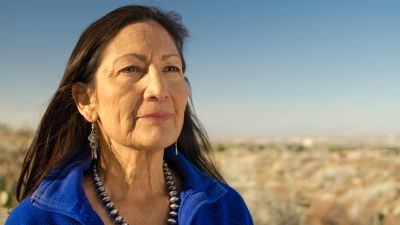
Wendy Buchner (left) high-fives Emily Miller (center) after Buchner, Miller and Cindy Scheneman (right) dug a fence post hole for a new fence at a house on April 13, 2016. Rebuilding Together Metro Denver and Lowes provided critical repairs and upgrades to four homes and the ACS Community Lift building. ACS is a nonprofit that provides the west Denver community with a food bank, limited free medical care and work force opportunities. (Photo by Andy Cross/The Denver Post via Getty Images)
This post originally appeared at Yes! Magazine.
Americans are really stressed out, according to a new poll by the American Psychological Association. That’s not news, but what’s surprising is that we are slightly more stressed out by the future of our country (63 percent) than by the usual stressors — money (62 percent) and work (61 percent). In fact, well over half of all Americans, 59 percent, believe this is “the lowest point in our nation’s history.”
I share this worry, although I also see possibility in that number — possibility that we are finally ready to turn things around. The era of empire, white supremacy, dirty energy and global capitalism has shown itself to be terribly destructive, and the number of people who benefit continues to shrink. The legitimacy of this system is eroding, just as apartheid did in South Africa and the empire of the USSR did. In both cases, enormously powerful systems collapsed quickly, but only after years of work.
Change at this scale is disorienting and even frightening, especially when it is hard to conceive of the outcome.
Reimagining our world
Albert Einstein said, “No problem can be solved from the same consciousness that created it.”
I believe it is also true that we can’t make the transition to a new society within the framework of the old. Or, as Audre Lorde said, “The master’s tools will never dismantle the master’s house.” Obsessing over Donald Trump’s latest tweet or the misdeeds of the powerful keeps us within that old mindset, distracting us from work that might actually save us, the work of reimagining the world we want, and creating it.
I’ve come to believe that this work of reimagining is humble, small, often taps feminine energy, is fundamentally indigenous — and local. One way to learn what that means is to ask people who are rebuilding after a major collapse, like those now living in Puerto Rico. So I called up my colleague at PeoplesHub, Melissa Rosario, who lives in San Juan, Puerto Rico.
Melissa had been building an urban center of cooperative economics, ecologically light living and “embodied pedagogy” (healing, starting with the body). In the aftermath of the hurricanes, her work has taken on a new immediacy, she told me. Along with friends in the Puerto Rican diaspora — in Detroit, New York and elsewhere on the US mainland — she has been assembling healing supplies: herbal tinctures and syrups for respiratory and immune system health, salves for treating wounds, graphics showing acupressure points, instructions in breathing exercises and other techniques for working through trauma, emotional overwhelm, depression and insomnia.
“We want to restore to people the sense that their body can tell them what’s wrong, that they know best what they need,” she told me.
One of the first places where she brought the medicine kits was to a group of moms, grandmothers and children from a nearby neighborhood, who, along with a feminist collective, were using an abandoned building as a gathering place. A party was in full swing when Melissa arrived: Children were making masks for Halloween, while others were dancing to music playing from battery-powered speakers.
Melissa told me that her work, and the work of other progressives, is now more immediate, more grounded in people’s needs instead of in abstractions.
Also, because internet connections and electricity are scarce, people are spending less time on their devices.
“It’s wiping away the distractions, the veils,” she said. “I feel much more clear and aligned and just present. If you’re aware, there are more possibilities. It’s thrilling, hopeful and also exhausting!”
The joy Melissa described in the abandoned building reminds me of the joy I witnessed on my road trip when people gathered to grow and share food or create a cooperative enterprise.
Building together locally is a no-regrets strategy. It releases joy at a time when so many are stressed — just the company of others, engaged in a common purpose, satisfies a deep soul yearning. And if there’s a natural disaster, we’ll need each other to rebuild. Same thing if civilization cracks under the stresses of the climate catastrophe (or from one of the other possible disasters — global or local). If we muddle through with the old power structures intact, local power will prevent the worst abuses, relieve isolation and increase prospects for a society that works for all.
Through this long, hard — but also joyful — work, we may indeed find more and more of our communities becoming more just and ecologically sustainable and maybe even more filled with compassion. And from this foundation, we can build a better country and a better world, rooted in authentic relationships where we live.




